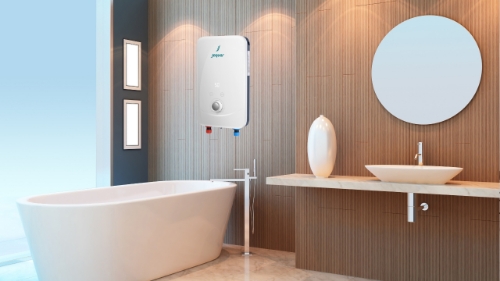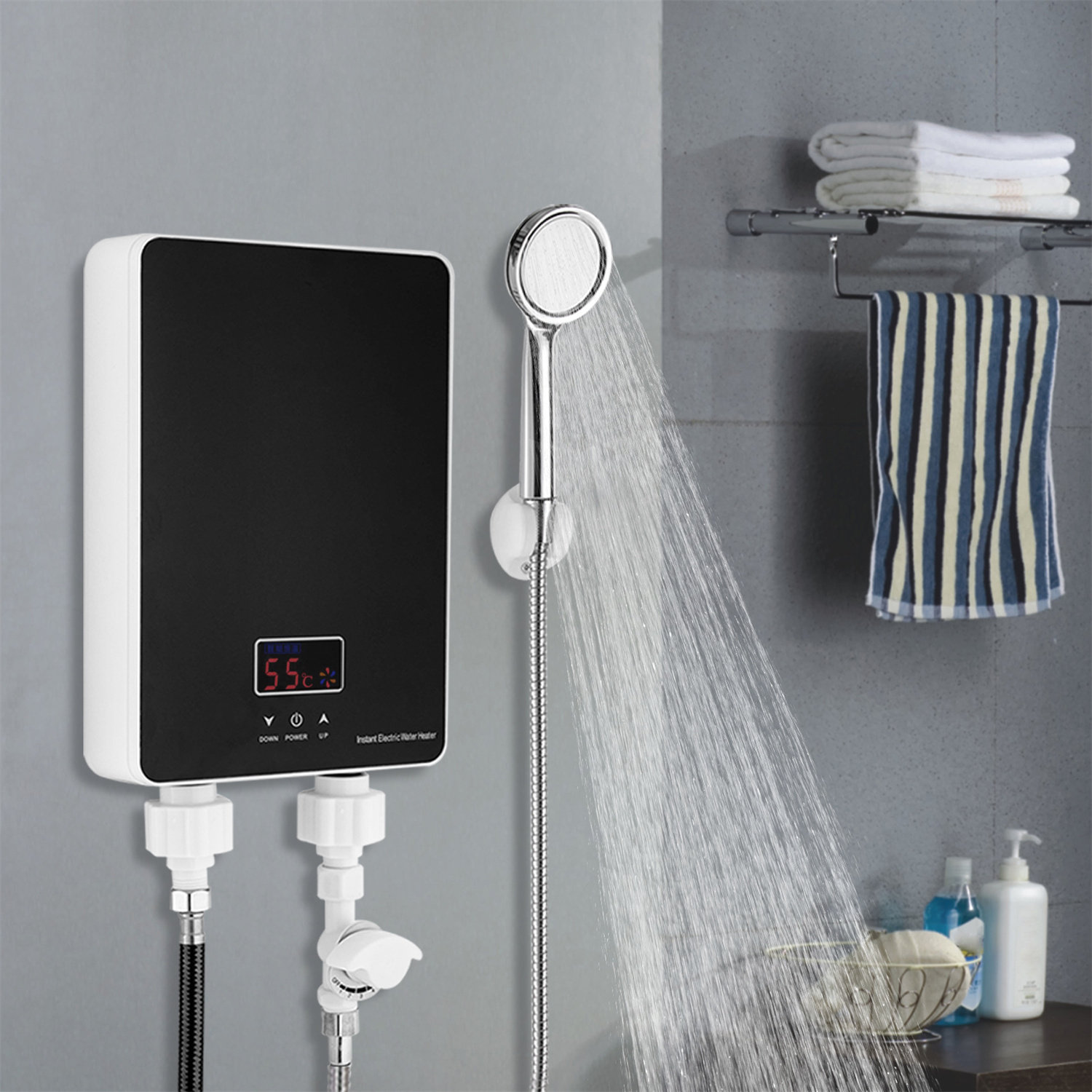Key Factors Why Tankless Water Heaters Are Beneficial
Key Factors Why Tankless Water Heaters Are Beneficial
Blog Article
They are making a number of great pointers related to 5 Benefits of Tankless Water Heaters as a whole in this article which follows.

In a world where comfort and efficiency preponderate, it's not a surprise that house owners are constantly looking for smarter methods to handle their home's power intake and comfort. One advancement that has actually steadily acquired popularity is the tankless water heater. But just what makes these systems stick out from the conventional tank-based models most of us grew up with? Allow's dive in and check out the benefits of tankless hot water heater, assisting you determine if it's time to make the button in your house.
Introduction
Picture this: you enter the shower after a lengthy day, anticipating a relaxing waterfall of warm water, only to be welcomed by icy beads because the last person used it all up. Sound familiar? Conventional water heaters keep a fixed quantity of hot water, indicating you go to the mercy of that tank's supply. Tankless systems, on the other hand, warmth water on demand. No more running out mid-shower, say goodbye to fumbling with routines just to make certain warm water is readily available.
Recognizing Tankless Water Heaters
What Are Tankless Hot Water Heater?
Tankless hot water heater, occasionally referred to as on-demand or instant water heaters, give hot water only as it's needed. As opposed to saving gallons of pre-heated water, these systems kick into action the minute you switch on the tap. Water travels through a warm exchanger, heating up in real-time, meaning you get a nonstop circulation of hot water without the requirement for a huge tank sitting lazily by.
Just how Do They Vary from Traditional Systems?
Conventional heating units hold a storage tank of hot water, making use of power to maintain that storage tank at a regular temperature. Tankless systems get rid of the standing supply, lowering wasted power and the cumbersome footprint of a big cyndrical tube. Basically, you're upgrading from a "stockpile" way of thinking to a "made-to-order" strategy.
Usual Types of Tankless Units
Tankless water heaters typically are available in two ranges: gas and electric. Gas models tend to deliver higher flow rates, ideal for bigger families, while electric versions frequently offer smaller homes and are usually much easier to mount. Additionally, some systems are created for point-of-use (offering one fixture) while others can manage the entire home's warm water demands.
Secret Benefits of Tankless Hot Water Heater
Energy Efficiency and Expense Financial Savings
No more heating up a titan container's worth of water and maintaining it warm all the time. Tankless heaters lower standby energy losses, which can lower energy bills. While the first cost may be greater, the long-term savings commonly justify the financial investment.
3. Space-Saving Layout
If your home is short on storage, eliminating the large storage tank liberates useful room. Tankless units are compact and can often be placed on walls, concealed in edges, or installed in limited energy wardrobes without grabbing all of the entire space.
4. Longer Life expectancy
A properly maintained tankless water heater can outlive its tank-based relative. Conventional containers could last 10-15 years, while tankless versions can keep chugging along for twenty years or even more, making them a strong financial investment in time.
1. Countless Hot Water Supply
Ever before had to set up showers so every person gets their reasonable share of warm water? With tankless, that ends up being a distant memory. As long as the heating unit's circulation ability isn't gone beyond, you can take back-to-back showers without developing into a popsicle.
5. Improved Water High Quality
Keeping water in a container can occasionally result in debris build-up or a slightly "off" taste. With tankless systems, fresh water is heated up right away, reducing the possibilities of sediment build-up and potentially offering cleaner-tasting water.
Considerations Before Changing
Though the benefits are engaging, it's important to think about a few factors prior to totally devoting.
Examining Your Home's Water Usage Patterns
If your family all at once utilizes several components with high hot water demand, make certain the unit's circulation rate satisfies your requirements. Knowing your use patterns helps you select the ideal size and sort of tankless heater.
Maintenance and Care Tips
Tankless systems are fairly reduced upkeep, however they aren't set-it-and-forget-it home appliances.
Normal Cleaning and Descaling
Tough water minerals can develop in the heat exchanger, influencing efficiency. Regular descaling (commonly advised yearly) maintains the unit going for peak performance.
Annual Professional Examinations
A yearly checkup from a specialist makes certain small issues are captured early. They'll analyze the unit's performance, try to find leaks, and assist keep optimal effectiveness.
Initial Financial Investment Prices
Tankless heating units usually include a greater in advance price tag. Between the system itself and potential installment adjustments, the preliminary cost may provide you sticker shock. But keep in mind to view it as a long-lasting financial investment.
Setup Requirements
Relying on your home's framework, you may require added electric capability or gas line upgrades. Guarantee you comprehend the setup needs and talk to an expert to prevent shocks.
Making Certain Proper Air Flow
For gas models, proper ventilation is vital to safely expel exhaust gases. Make certain airing vent systems are tidy and properly mounted to stop any type of possible security threats.
Contrasting Different Brands and Versions
Not all tankless water heaters are created equivalent.
Looking Into Trusted Manufacturers
Seek reliable brand names with a history of generating top quality devices. A dependable manufacturer commonly offers better client assistance and longer service warranties.
Installation: Do It Yourself or Expert?
While some homeowners relish tackling tasks themselves, tankless installment may not be the very best time to break out the toolbox.
Pros and Cons of DIY Installation
A DIY install can save money, but it features risks. Inaccurate setup can cause inefficiency or safety and security issues. If you're handy and have experience, it might be possible-- however proceed with caution.
Checking Out Testimonials and Individual Feedback
User testimonials and responses from next-door neighbors or pals who have actually gone tankless can supply valuable understandings. Sometimes, real-life experiences can be more informing than marketing sales brochures.
When to Call an Expert Plumbing Technician
For the majority of, calling a pro makes sure every little thing's done appropriately. A specialist plumbing professional understands local codes, sizing demands, and airing vent parameters, lowering the danger of incidents.
Taking full advantage of Performance
You have actually purchased a tankless unit-- currently optimize its efficiency.
Ideal Temperature Setups
Lots of people set their devices in between 120-140 F. Readjusting the temperature can enhance comfort and savings. Experiment to find a wonderful spot that does not lose energy.
Pairing with Low-Flow Fixtures
Intend to extend your device's capacities? Consider mounting low-flow showerheads and faucets. They reduce water use, permitting your tankless system to supply a stable stream of hot water without stressing.
Environmental Effect
Tankless hot water heater line up with greener living goals.
Lowered Carbon Impact
By utilizing less energy and just heating water as needed, tankless systems can lower your home's carbon footprint, reducing your ecological impact.
Preserving Natural Resources
Much less power intake and much less lost warm water convert right into fewer natural resources being utilized, an environmental win-win.
Who Profits Most from Tankless Heaters?
The elegance of tankless heating systems is that they can match a variety of households.
Large Families vs. Single Passengers
Large households may love the endless hot water supply, while solitary owners value the energy cost savings from not warming an entire tank for just a single person's early morning shower.
Homeowners with Limited Space
If your home is short on square video footage, losing the cumbersome container liberates room for various other fundamentals-- or perhaps simply a lot more elbow room.
Eco-Conscious Consumers
Going tankless aligns with eco-friendly worths, ensuring you're not losing power or sources.
Future Fads in Tankless Water Heaters
The world of home appliances is ever-evolving, and tankless hot water heater are no exception.
Advancements in Innovation
R&D is regularly improving warm exchangers, making units extra effective and sturdy. Future models might be even quieter, much more small, and much better fit for differing climates.
Smart Home Assimilation
Picture changing your hot water heater's temperature by means of an application or obtaining upkeep notifies on your phone. As smart home tech advancements, we'll see more connectivity and convenience.
Final thought
Choosing a tankless water heater is more than just upgrading your home's hot water system; it's purchasing long-term comfort, energy efficiency, and a greener way of living. By considering your family's water usage, being mindful of setup needs, and devoting to regular upkeep, you can take pleasure in a constant stream of warm water without the baggage of a large container. As modern technology advances, you can anticipate also smarter, a lot more efficient tankless remedies that not only make your life much easier yet likewise benefit the world.
Why You Should Consider a Tankless Water Heater for Your Home
Energy Efficiency and Cost Savings
Tankless water heaters, also known as on-demand water heaters, heat water only when needed. This means they don't waste energy keeping a tank of water hot constantly. This efficiency translates into substantial cost savings on your monthly energy bills.
Endless Hot Water Supply
One of the significant advantages of tankless water heaters is their ability to provide a continuous supply of hot water. Traditional tank water heaters have a limited capacity and can run out of hot water, especially during peak usage times. In contrast, tankless water heaters can provide an endless stream of hot water, making them ideal for larger families or homes with high water usage.
Space-Saving Design
Tankless water heaters are compact and take up significantly less space compared to traditional tank heaters. They can be installed on walls, under cabinets, or even outside, freeing up valuable space in your home. This makes tankless water heaters a great option for smaller homes or properties with limited space for a traditional water heater.
Longer Lifespan and Lower Maintenance
Tankless water heaters typically have a longer lifespan compared to traditional tank heaters. They can last up to 20 years or more with proper maintenance. Additionally, tankless systems are designed with replaceable parts, which can extend their lifespan further and reduce long-term maintenance costs.
Environmentally Friendly
Reducing energy consumption not only saves you money but also benefits the environment. Tankless water heaters contribute to a smaller carbon footprint by using less energy to heat water. Their energy efficiency and ability to minimize standby heat loss make them an eco-friendly choice for environmentally conscious homeowners.
Customized Temperature Control
Tankless water heaters offer precise temperature control, allowing you to set the desired temperature to meet your specific needs. This level of customization ensures you always have water at the perfect temperature for your comfort and usage requirements.
https://beantownservices.com/blog/consider-tankless-water-heater-for-your-home

I'm certainly very inquisitive about Pros and Cons of Tankless Water Heater and I am assuming you appreciated our blog post. If you appreciated our blog post please make sure you remember to share it. Thanks so much for taking the time to read it.
Book Maintenance Report this page